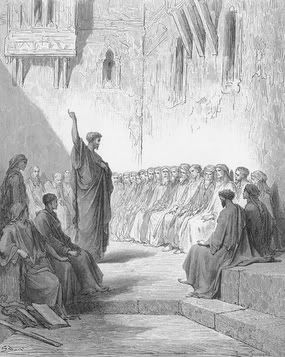
Acts 17:1-15
Paul Preaches in Thessalonica
1 Paul and Silas then traveled through the towns of Amphipolis and Apollonia and came to Thessalonica, where there was a Jewish synagogue. 2 As was Paul’s custom, he went to the synagogue service, and for three Sabbaths in a row he used the Scriptures to reason with the people. 3 He explained the prophecies and proved that the Messiah must suffer and rise from the dead. He said, “This Jesus I’m telling you about is the Messiah.” 4 Some of the Jews who listened were persuaded and joined Paul and Silas, along with many God-fearing Greek men and quite a few prominent women.
5 But some of the Jews were jealous, so they gathered some troublemakers from the marketplace to form a mob and start a riot. They attacked the home of Jason, searching for Paul and Silas so they could drag them out to the crowd. 6 Not finding them there, they dragged out Jason and some of the other believers instead and took them before the city council. “Paul and Silas have caused trouble all over the world,” they shouted, “and now they are here disturbing our city, too. 7 And Jason has welcomed them into his home. They are all guilty of treason against Caesar, for they profess allegiance to another king, named Jesus.”
8 The people of the city, as well as the city council, were thrown into turmoil by these reports. 9 So the officials forced Jason and the other believers to post bond, and then they released them.
Paul and Silas in Berea
10 That very night the believers sent Paul and Silas to Berea. When they arrived there, they went to the Jewish synagogue. 11 And the people of Berea were more open-minded than those in Thessalonica, and they listened eagerly to Paul’s message. They searched the Scriptures day after day to see if Paul and Silas were teaching the truth. 12 As a result, many Jews believed, as did many of the prominent Greek women and men.
13 But when some Jews in Thessalonica learned that Paul was preaching the word of God in Berea, they went there and stirred up trouble. 14 The believers acted at once, sending Paul on to the coast, while Silas and Timothy remained behind. 15 Those escorting Paul went with him all the way to Athens; then they returned to Berea with instructions for Silas and Timothy to hurry and join him.
* * *
As you share your faith remember that the Gospel of Jesus Christ will never change. Your audience’s response, however, may vary from person to person. Family, friends, and strangers: you do not know how they will react the Gospel Message. But you must always remember that anyone can believe.
When Paul and Silas entered the city of Berea, an audience different from Thessalonica received them. After traveling 60 miles south from Thessalonica, the apostles immediately went to work: “When they arrived there, they went to the synagogue” (v.10). There, they found Jews and “God-fearing Gentiles” who were “more open-minded than those in Thessalonica,” and who “listened eagerly to Paul’s message” (v.11).
The Thessalonians had an emotional response to the Word. The Bereans approached the message intellectually: “They searched the Scriptures day after day to check up on Paul and Silas, to see if they were really teaching the truth” (v.12). They were interested in the Gospel but tested its strength. When they listened to the Apostles preach about the Messiah, they understood that Jesus fulfilled Old Testament prophecy. As a result, “many Jews believed, as did some of the prominent Greek women and many men” (v.12).
When you were first presented with Christ’s Message, how did you respond? Were you like the emotional converts of Thessalonica or the intellectual believers of Berea? As you grow in your faith try to hold dual citizenship; remember the emotional, passionate response you had to Christ’s sacrifice, and the intellectual, logical beliefs you discovered when you studied His Word.